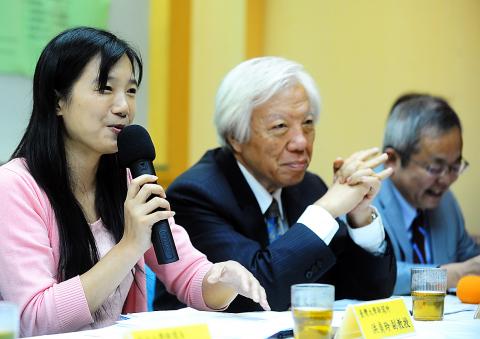Fearing the approval of an application by Want Want China Times Group to purchase China Network Systems would turn the former into a “media monster” monopoly, academics held a press conference yesterday to urge the National Communications Commission (NCC) to block the acquisition.
On the eve of the second public hearing for the merger review today, academics said an Internet petition against the merger initiated by 54 academics had received the support of 78 civic groups and 2,136 individuals over six days.
Want Want China Broadband already has major newspapers, magazines, publishing firms and cable and wireless TV news channels, National Taiwan University associate professor Hung Chen-ling (洪貞玲) said, adding that if the merger with CNS was approved, a multiple system operator that operates 11 cable TV and broadband Internet services would account for about 30 percent of the total media audience in Taiwan.

Photo: Wang Yi-sung, Taipei Times
Hung said academics feared the NT$70 billion (US$2.3 billion) merger attempt by the group — which has a track record of “bad behavior” for accusing NCC commissioners in its newspaper and filing suits on reporters — risked leading to high media concentration, harming freedom of the press.
Shih Jun-ji (施俊吉), a research fellow at Academia Sinica’s Institute of Social Science, said it made no sense to continue the review when three of the seven review committee members had already walked out.
“With only four members left, the committee is not competent to review this important case,” Shih said.
The academics urged the commission to stop the review process and establish an ad hoc committee including citizen representatives and specialists from various fields to investigate the case.
Hu Yuan-hui (胡元輝), an associate professor at National Chung Cheng University’s department of communications and president of the Foundation for Excellent Journalism, said that many studies showed that high media concentration undermines the quality of the media environment, not only in terms of lack of content diversity but also independence and the labor conditions of journalists.
Lin Yuan-huei (林元輝), a professor at National Chengchi University’s department of journalism, said studies have shown that the China Times has provided much more entertainment news about Want Want group’s cable channels since the last merger.
The academics said they also feared that with a large proportion of Want Want Group chairman Tsai Eng-ming’s (蔡衍明) profits being made in China, there was reason to suspect that messages favorable toward the Chinese government would affect media content in Taiwan.
“Having control over the channels also means control over their content,” Shih said, adding that the merger could affect as many as 4 million viewers if it were allowed to proceed.
Some academics also expressed support for the media to monitor government officials and political figures to protect the public interest. They criticized Chinese Nationalist Party (KMT) caucus whip Hsieh Kuo-liang’s (謝國樑) lawsuit against Internet news source New Talk reporter Lin Chau-yi (林朝億) for reporting that Hsieh had tried to pressure the commission into approving the merger.
Association of Taiwan Journalists executive committee member Liu Ming-tang (劉明堂) said it was improper for legislators to file lawsuits against ordinary citizens to express their discontent.

Chinese Nationalist Party (KMT) Chairman Eric Chu (朱立倫), spokeswoman Yang Chih-yu (楊智伃) and Legislator Hsieh Lung-chieh (謝龍介) would be summoned by police for questioning for leading an illegal assembly on Thursday evening last week, Minister of the Interior Liu Shyh-fang (劉世芳) said today. The three KMT officials led an assembly outside the Taipei City Prosecutors’ Office, a restricted area where public assembly is not allowed, protesting the questioning of several KMT staff and searches of KMT headquarters and offices in a recall petition forgery case. Chu, Yang and Hsieh are all suspected of contravening the Assembly and Parade Act (集會遊行法) by holding

PRAISE: Japanese visitor Takashi Kubota said the Taiwanese temple architecture images showcased in the AI Art Gallery were the most impressive displays he saw Taiwan does not have an official pavilion at the World Expo in Osaka, Japan, because of its diplomatic predicament, but the government-backed Tech World pavilion is drawing interest with its unique recreations of works by Taiwanese artists. The pavilion features an artificial intelligence (AI)-based art gallery showcasing works of famous Taiwanese artists from the Japanese colonial period using innovative technologies. Among its main simulated displays are Eastern gouache paintings by Chen Chin (陳進), Lin Yu-shan (林玉山) and Kuo Hsueh-hu (郭雪湖), who were the three young Taiwanese painters selected for the East Asian Painting exhibition in 1927. Gouache is a water-based

Taiwan would welcome the return of Honduras as a diplomatic ally if its next president decides to make such a move, Minister of Foreign Affairs Lin Chia-lung (林佳龍) said yesterday. “Of course, we would welcome Honduras if they want to restore diplomatic ties with Taiwan after their elections,” Lin said at a meeting of the legislature’s Foreign Affairs and National Defense Committee, when asked to comment on statements made by two of the three Honduran presidential candidates during the presidential campaign in the Central American country. Taiwan is paying close attention to the region as a whole in the wake of a

OFF-TARGET: More than 30,000 participants were expected to take part in the Games next month, but only 6,550 foreign and 19,400 Taiwanese athletes have registered Taipei city councilors yesterday blasted the organizers of next month’s World Masters Games over sudden timetable and venue changes, which they said have caused thousands of participants to back out of the international sporting event, among other organizational issues. They also cited visa delays and political interference by China as reasons many foreign athletes are requesting refunds for the event, to be held from May 17 to 30. Jointly organized by the Taipei and New Taipei City governments, the games have been rocked by numerous controversies since preparations began in 2020. Taipei City Councilor Lin Yen-feng (林延鳳) said yesterday that new measures by